You’ve likely heard the term “blood diamonds.” Also known as “conflict diamonds,” these precious stones have helped fund civil wars and contributed to some 3.7 million deaths in Angola, Sierra Leone, and the Democratic Republic of Congo (DRC) according to an Amnesty International report.
The term “conflict minerals” doesn’t have quite the same ring, nor a titular film starring Leonardo DiCaprio, but they are at the center of a recently leaked memo from the White House. The memo seeks to dismantle the Conflict Minerals Rule in the 2010 Dodd-Frank Wall Street Reform and Protection Act. Under Dodd-Frank, companies had to disclose whether or not their products contain minerals mined in the Democratic Republic of Congo or a neighboring country. The reason to withdraw this clause that valued human life over electronics? Perceived job loss and costs to American companies, estimated at $3-4 billion in upfront compliance costs and $200 million annually thereafter.
What is life like for the miners of conflict minerals – tin, tantalum, tungsten, and gold ore – in the Democratic Republic of Congo and neighboring countries? The Guardian reports a systematic web of sexual violence, kidnapping, child labor, and modern-day slavery.
An overwhelming abundance of human suffering all so we can play Bejeweled on an almost dizzying array of devices. Tech giants, Apple and Intel, have spoken out against the repeal of the Conflict Minerals Rule, but fear that enforcement will be difficult without written law. Human rights groups representing some 100 organizations in and around DRC have also spoken out against repeal of the Rule:
Thanks to the Dodd-Frank Act, Eastern DRC has to date more than 220 certified green mining sites, more than 300 mining police officers trained and deployed to secure mining sites,an independent audit mechanism, and a regional certification system. These advances undoubtedly contribute to reducing the rate of crime and human rights violations, including rape of women and exploitation of children in mining areas. All these efforts and progress will be destroyed if the US Government decides to contradict itself by repealing the Dodd-Frank Act.
It isn’t just Big Business that has taken a hit under the Conflict Minerals Rule. A healthy dose of criticism cites that the Rule has actually made miners and their families in DRC poorer. In many ways, the implementation of the Rule slowed down, or stopped, mining due to implementation issues of the government and business variety. Millions, out of work, were left between the proverbial rock and the hard place: either face starvation or join the militias that the very Rule were designed to protect them against. Closing of mines is felt throughout communities:
With less money flowing in, shops in Luntukulu have closed. Many people struggle to feed their families through farming. “If Obama’s law wasn’t signed, the ban would not have existed,” said Waso Mutiki, 41, president of the miners’ co-operative in Luntukulu. “It destroyed everything.”
Others who contest the Rule say that the it does not acknowledge or alleviate deeply systemic issues afflicting the region, such as in this open letter signed by academics, politicians, and civil society professionals:
First, while the minerals help perpetuate the conflict, they are not its cause. National and regional political struggles over power and influence as well as issues such as access to land and questions of citizenship and identity are just some of the more structural drivers of conflict. The ability to exploit and profit from minerals is often a means to finance military operations to address these issues, rather than an end in itself.
The authors of the open letter above offer some alternative strategies which seek to buoy the economy by incentivising better practice and fair competition for international and Congolese businesses. Dollar for dollar, the Democratic Republic of the Congo is one of the richest countries in the world when it comes to untapped mineral resources. The people who seek to own that wealth and exploit its potential are many, and unfortunately, Congolese citizens and their communities are not among those to first reap those benefits.
So, what is the bottom line? Some might say the Conflict Minerals Rule sees the forest but not the trees, doing significant damage to local economies and livelihoods despite the progress made by eliminating a driver of local conflict. It serves as yet another example of the need for policies to be developed and refined with community feedback. A globally engaged U.S. administration might attempt to build on the successes of the Rule with foreign and trade policy that takes such feedback into account. But the current administration seems to have different priorities. Rather than approaching policymaking in a way that benefits the communities most heavily impacted, or even that takes into account the expectations of American consumers, President Trump fights for the common man…the average, American CEO:
Government and community collaboration are key in achieving meaningful reform. Whether or not the U.S. Administration will take part in that exchange remains to be seen.

